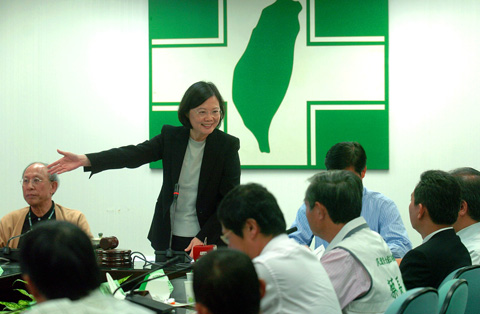Democratic Progressive Party (DPP) Chairwoman Tsai Ing-wen (蔡英文) yesterday hit back at the Presidential Office for painting and criticizing her as an independence fundamentalist.
Tsai said that the Presidential Office overly simplified her remarks in an interview, which appeared in three Chinese-language newspapers yesterday, and that she had just asked President Ma Ying-jeou (馬英九) a few questions.
“I just asked a few questions and I would like to see him answer them,” she said. “It is not a good idea to stick a label on other people.”

PHOTO: CHIEN JUNG-FONG, TAIPEI TIMES
In the interviews, Tsai criticized Ma for failing to mention in his inaugural address that Taiwan’s 23 million people have the final say on the nation’s future.
In response, an official at the Presidential Office said there was no need to mention it because it is a fact that Taiwanese have a say on the country’s future because they can elect legislators and presidents.
She also criticized the Ma administration for retreating on the issue of sovereignty. She said she would like to know why the administration wanted to resume cross-strait negotiations based on the so-called “1992 consensus,” without clarifying what the consensus refers to.
Tsai said the administration has now chosen to keep mum on the KMT’s previous contention that the so-called consensus refers to “one China, with each side having its own interpretation.”
Tsai said that the Ma government’s plan to apply for WHO membership under the name “Chinese Taipei” without undertaking political negotiations was unacceptable and a step backward.
The Presidential Office retorted by saying that the officials documents of the WTO refer to the country as “Chinese Taipei” and the country did not gain accession to the international body until 2002 when Chen Shui-bian (陳水扁) was president.
Tsai said yesterday that the details of the WTO application were decided by the then-KMT administration and the DPP administration was not responsible for them.
Tsai also met the heads of local chapters of the DPP in Taipei yesterday. After listening to their opinions, Tsai instructed the party’s Department of Organizational Development to conduct a census of party members as part of its efforts to reform the party following its defeat in the legislative and presidential elections earlier this year.
Tsai called for unity at the party meet yesterday, saying the party was just starting its uphill climb to initiate changes.
Charter bosses attending the meeting reached a consensus that party members should refrain from attacking each other.
In other news, the DPP’s Party Reform Task Force held its first meeting yesterday and decided to propose a reform package on June 18 so it can be ready for debate at the party’s National Congress on July 20.
DPP Secretary-General Wang Tuoh (王拓), who also serves as the convener of the task force, said the nine-member group would discuss three main issues: revision of the party platform, discipline and evaluation and nomination process.
Lin Chia-lung (林佳龍), a member of the task force, said that with Tsai as the party’s new leader, the priorities are to reshape the image of the party and to settle the nomination for next year’s local chief elections as soon as possible.

DEFENSE: The National Security Bureau promised to expand communication and intelligence cooperation with global partners and enhance its strategic analytical skills China has not only increased military exercises and “gray zone” tactics against Taiwan this year, but also continues to recruit military personnel for espionage, the National Security Bureau (NSB) said yesterday in a report to the Legislative Yuan. The bureau submitted the report ahead of NSB Director-General Tsai Ming-yen’s (蔡明彥) appearance before the Foreign and National Defense Committee today. Last year, the Chinese People’s Liberation Army (PLA) conducted “Joint Sword-2024A and B” military exercises targeting Taiwan and carried out 40 combat readiness patrols, the bureau said. In addition, Chinese military aircraft entered Taiwan’s airspace 3,070 times last year, up about

A magnitude 4.3 earthquake struck eastern Taiwan's Hualien County at 8:31am today, according to the Central Weather Administration (CWA). The epicenter of the temblor was located in Hualien County, about 70.3 kilometers south southwest of Hualien County Hall, at a depth of 23.2km, according to the administration. There were no immediate reports of damage resulting from the quake. The earthquake's intensity, which gauges the actual effect of a temblor, was highest in Taitung County, where it measured 3 on Taiwan's 7-tier intensity scale. The quake also measured an intensity of 2 in Hualien and Nantou counties, the CWA said.

The Overseas Community Affairs Council (OCAC) yesterday announced a fundraising campaign to support survivors of the magnitude 7.7 earthquake that struck Myanmar on March 28, with two prayer events scheduled in Taipei and Taichung later this week. “While initial rescue operations have concluded [in Myanmar], many survivors are now facing increasingly difficult living conditions,” OCAC Minister Hsu Chia-ching (徐佳青) told a news conference in Taipei. The fundraising campaign, which runs through May 31, is focused on supporting the reconstruction of damaged overseas compatriot schools, assisting students from Myanmar in Taiwan, and providing essential items, such as drinking water, food and medical supplies,

Taiwan is stepping up plans to create self-sufficient supply chains for combat drones and increase foreign orders from the US to counter China’s numerical superiority, a defense official said on Saturday. Commenting on condition of anonymity, the official said the nation’s armed forces are in agreement with US Admiral Samuel Paparo’s assessment that Taiwan’s military must be prepared to turn the nation’s waters into a “hellscape” for the Chinese People’s Liberation Army (PLA). Paparo, the commander of the US Indo-Pacific Command, reiterated the concept during a Congressional hearing in Washington on Wednesday. He first coined the term in a security conference last